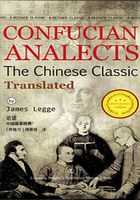
CHAPTER 15
The Master said of Tsze-ch'an that he had four of the characteristics of a superior man:—in his conduct of himself, he was humble; in serving his superior, he was respectful; in nourishing the people, he was kind; in ordering the people, he was just."
13. THE ARDOUR OF TSZE-LOO IN PRACTISING THE MASTER'S INSTRUCTIONS. The concl.唯恐有闻 is t o be completed 唯恐复有所闻, as in the translation.
14. AN EXAMPLE OF THE PRINCIPLE ON WHICH HONORARY POSTHUMOUS TITLES WERE CONFERRED. 文, corresponding nearly to our 'accomplished', was the posthum. title given to 子圉, an officer of the state of Wei, and a contempor. of Conf. Many of his actions had been of a doubtful char., which made Tsze-kung stumble at the applica. to him of so hon. an epithet. But Conf. shows that, whatever he might otherwise be, he had those qualities, which justified his being so denominated. The rule for posth. titles in China has been, and is, very much—'De mortnis nil nisi bonum.'
15. THE EXCELLENT QUALITLES OF TSZECH'AN. Tsze-ch'an, named 公孙侨, was the chief min. of the state of Ching (郑), the ablest perhaps, and most upright, of all the statesmen among Conf. contemporaries. The sage wept when he heard for his death. The old interpret. take 使 in the sense of 'employing', but it seems to express more, and= 'ordering', 'regulating'.
